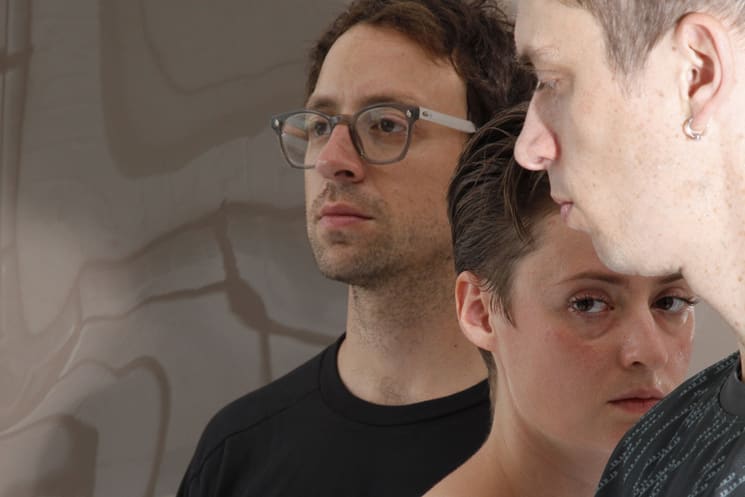Toronto's DIANA have made a tender yet bombastic new record, three years after the release of their debut, Perpetual Surrender. Consisting of vocalist and guitarist Carmen Elle, keyboardist/tenor saxophonist Joseph Shabason (who also works with Destroyer) and drummer/producer Kieran Adams, the band have gone for a grander sound on their second album.
Familiar Touch embraces influences like Sade and Talk Talk, with lyrics that provide a unique exploration of relationships. Shades of hometown predecessors like Broken Social Scene can be heard in the mix of Elle's calming vocals, and the hum of synthesizers on tracks such as the album's closer, "Take It Over."
Shabason and Adams relay that their sonic explorations are often more about vibe than specific sounds. "I'll reference certain things, just be like, 'Okay, I want it to have this type of feeling, what's a song I know that has that type of feeling?'" Adams explains. "Not even like, 'I want this sound,' but 'How does the arrangement work? What sort of textures help move the song forward?'"
"I think once it goes through the filter of all of us, it sounds similar but different," Shabason adds. "It takes on its own form."
To make Familiar Touch, DIANA enlisted a range of collaborators, including vocalist Gary Beals, best known as the runner up on the debut season of Canadian Idol. "We met because I run a dance party/cover band night in Toronto called Loving in the Name Of," Shabason explains. "Gary would come and sing Ginuwine and Prince — he's one of those singers where it was just like 'Holy shit,' he's just so captivating. When we were recording this album, I think Kieran was hearing some male, kind of R&B style vocals, and Gary was a no brainer."
After taking in various influences, including most of the band's formal jazz training, DIANA let the songs marinate. They decamped to Adams' loft in Toronto's Parkdale neighbourhood and took their time. "We just decided to take over that space," Adams says. "We were there almost every day for three months."
The band "realized in the end that it's just better when we don't feel any pressure to be rushed," Shabason concludes. "When you feel that pressure, it's pretty hard to be creative."
Familiar Touch embraces influences like Sade and Talk Talk, with lyrics that provide a unique exploration of relationships. Shades of hometown predecessors like Broken Social Scene can be heard in the mix of Elle's calming vocals, and the hum of synthesizers on tracks such as the album's closer, "Take It Over."
Shabason and Adams relay that their sonic explorations are often more about vibe than specific sounds. "I'll reference certain things, just be like, 'Okay, I want it to have this type of feeling, what's a song I know that has that type of feeling?'" Adams explains. "Not even like, 'I want this sound,' but 'How does the arrangement work? What sort of textures help move the song forward?'"
"I think once it goes through the filter of all of us, it sounds similar but different," Shabason adds. "It takes on its own form."
To make Familiar Touch, DIANA enlisted a range of collaborators, including vocalist Gary Beals, best known as the runner up on the debut season of Canadian Idol. "We met because I run a dance party/cover band night in Toronto called Loving in the Name Of," Shabason explains. "Gary would come and sing Ginuwine and Prince — he's one of those singers where it was just like 'Holy shit,' he's just so captivating. When we were recording this album, I think Kieran was hearing some male, kind of R&B style vocals, and Gary was a no brainer."
After taking in various influences, including most of the band's formal jazz training, DIANA let the songs marinate. They decamped to Adams' loft in Toronto's Parkdale neighbourhood and took their time. "We just decided to take over that space," Adams says. "We were there almost every day for three months."
The band "realized in the end that it's just better when we don't feel any pressure to be rushed," Shabason concludes. "When you feel that pressure, it's pretty hard to be creative."




